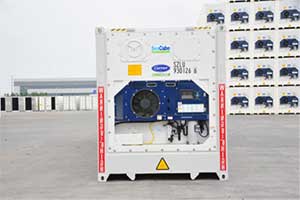Suboptimal transport conditions and equipment play a significant role in food wastage.
by Greg Tuthill, CCO, SeaCube Containers
It is estimated that 1.3 billion metric tons of food are lost or wasted annually, translating to a financial loss of $1 trillion USD per year. And without significant changes, this problem is expected to grow to 2.1 billion metric tons and $1.5 trillion by 2030.
Staggering as these numbers might be, they do not take into account the hidden costs of food production, including labor, storage and salvage or the costs related to customer dissatisfaction, lost opportunities, and inventory/stocking level imprecision.
Shockingly, one-third of all food produced for human consumption is lost due to wastage, which not only has significant financial implications, but also has environmental and social implications as well.

The commodities with the highest level of waste are:
Food waste and loss is pervasive throughout the entire food value chain – from farm to fork as they say. Harvesting, manufacturing, packaging, transporting and stock rotation as well as the consumers’ tendency to overbuy all contribute to excessive waste and spoilage.
While there are a lot of variables impacting food wastage, approximately 7-15% of the wastage happens during transport. There are many factors that could impact the inside temperature of a container – fluctuating regional outside temperatures throughout the chain, how full the container is, or even the opening of a container door. Even at 40 degrees Fahrenheit, food quality can begin to deteriorate, and bacteria can begin to grow in just one hour.

As the leading refrigerated equipment lessor, SeaCube understands the importance of optimizing equipment and utilizing technology to mitigate perishable wastage occurring during transport. Every Carrier reefer in the SeaCube fleet will be equipped with the Carrier Lynx Fleet Management solution, which will provide enhanced visibility to show where the container is, how it is performing as well as what is happening inside the container.
The Carrier Lynx Fleet solution includes proprietary technology that monitors reefer unit performance and provides early warning actionable diagnostics and predictive analytics down to the level of the machine’s components. Lynx Fleet will offer prognostics and data analytics on Carrier and non-Carrier equipment with features that provide differentiation such as improved fleet uptime, reduced operational costs and incremental value through lower cargo spoilage.
The usage of telematics technology in the intermodal supply chain allows for greater collaboration, increased transparency, and real-time information of the exact location and inside temperature of a container. Software using advanced algorithms provides notification of any significant events on route as well as predictive analysis that enables the planning of maintenance and repair before an event occurs.
SeaCube is committed to a forward-looking strategy that includes technology and telematics that will enable its customers to optimize their fleet, increase uptime and control conditions that protect their cargo.
Some food wastage is inevitable, but SeaCube believes it is their responsibility to utilize available technology to reduce waste and ensure perishables make it to their destination intact.

About the Author
As SeaCube’s Chief Commercial Officer, Gregory Tuthill leads the global sales, marketing, and trade teams. Mr. Tuthill served in the United States Naval Reserve as a Commissioned Officer and holds a US Coast Guard Third Mates License. He has obtained a Bachelor’s Degree in Computer Science from the State University Maritime College at Fort Schuyler, NY and earned a Master’s Degree in Financial Economics from Fairleigh Dickinson University.
Scott Ellyson, CEO of East West Manufacturing, brings decades of global manufacturing and supply chain leadership to the conversation. In this episode, he shares practical insights on scaling operations, navigating complexity, and building resilient manufacturing networks in an increasingly connected world.